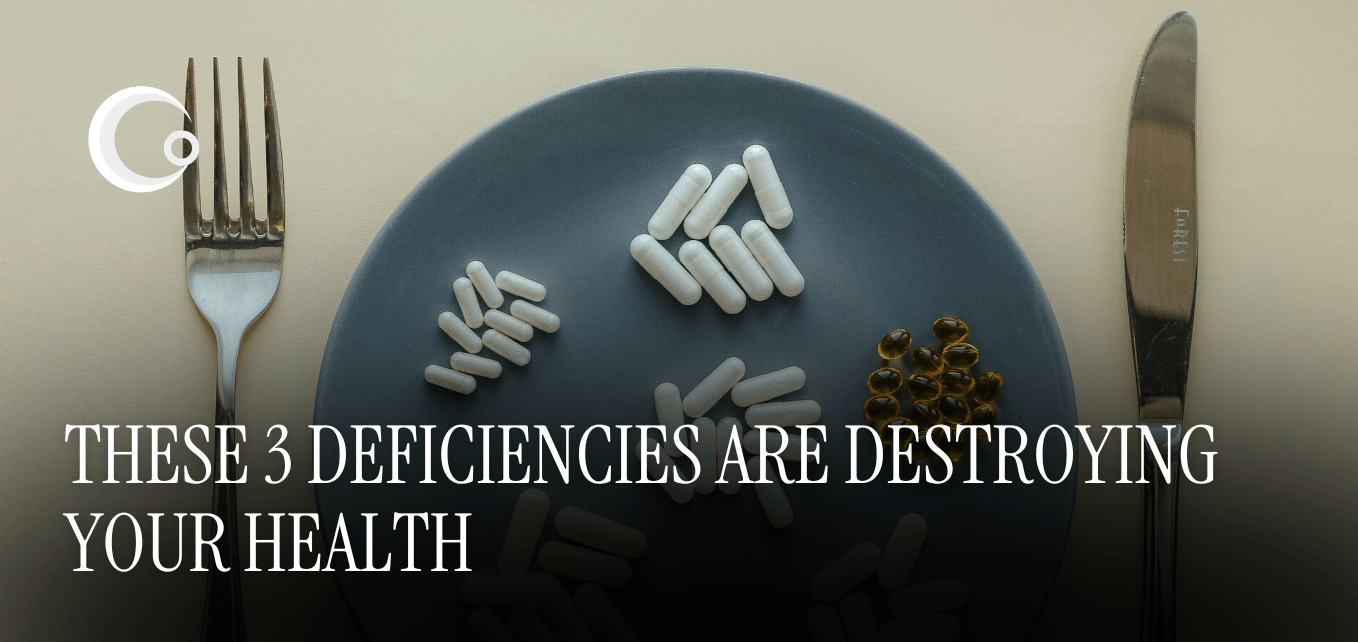
Welcome back. Welcome back. You're exhausted but can't sleep. Your workouts feel pointless. Men—your testosterone is tanking. Women—your hormones are all over the place. And everyone's walking around with brain fog thinking it's just "getting older."Here's the truth: You're not broken. You're deficient.Three specific deficiencies are wrecking your body's ability to function. Your doctor's blood work says you're "normal," but normal is just another word for average. And average means operating at 60% capacity.
1. Vitamin D - The hormone controller you're definitely missing
2. Magnesium - Why you can't sleep or recover
3. Omega-3 - The brain and inflammation fix
VITAMIN D
The "Vitamin" That's Actually a Hormone

Calling vitamin D a vitamin is medical gaslighting. It's a steroid hormone that controls over 1,000 genes in your body—including the ones that regulate testosterone, estrogen, and your ability to not feel like death.
70-80% of people are deficient. And no, your multivitamin's 1,000 IU isn't fixing it.
Why You're Screwed Without It
For men: Your testosterone is directly tied to vitamin D levels. Guys with levels above 30 ng/ml have significantly higher T than those below. But here's the kicker—30 is still deficient. You need 40-60 ng/ml for optimal testosterone production.
For women: Vitamin D regulates estrogen and progesterone balance. Deficiency means worse PMS, mood swings, and hormonal chaos. Women with optimal D levels show 50% fewer hormone-related symptoms.
For everyone: This controls whether you can make serotonin. Literally. It activates the enzyme (tryptophan hydroxylase 2) that converts tryptophan into serotonin. No D = no happy chemicals = depression.
The Darker Skin Disaster
If you have darker skin, you need six times longer sun exposure to make the same vitamin D as someone pale. If you're Black or Brown and live anywhere north of Atlanta, you're almost guaranteed deficient.
Over 50? Your skin basically forgot how to make vitamin D. You could lay in the sun all day and still be deficient.
The Fix
Dose: 5,000-10,000 IU daily (not the joke 1,000 IU your doctor suggests)
Target: 40-60 ng/ml on blood tests
Reality: Every 1,000 IU raises levels by only 5 ng/ml. If you're at 20 ng/ml (most people), you need 8,000 IU daily to hit optimal.
Take with: Fat (breakfast works). Add 100-200mcg K2 to prevent calcium issues.
Test: Every 3 months until optimal (if possible)
MAGNESIUM
The Missing Link to Everything

For stressed men: Magnesium regulates cortisol. High cortisol crushes testosterone. Every night of bad sleep is lowering your T levels. Fix the magnesium, fix the sleep, restore the testosterone.
For exhausted women: Magnesium is required to make progesterone—your calming, sleep-promoting hormone. Without it, you're anxious, irritable, and exhausted but wired.
The 3 PM Crash
That afternoon death feeling? Magnesium is required to make ATP—literal cellular energy. Without it, your cells can't produce energy efficiently. You're running on 60% battery all day.
Signs you're deficient:
Muscle cramps or eye twitches
The Fix
For sleep: Magnesium threonate (145mg) or glycinate (400mg)—only forms that cross the blood-brain barrier
For constipation: Citrate (but won't help sleep)
When: 30-60 minutes before bed
OMEGA-3
The Inflammation and Depression Destroyer

The Inflammation and Depression Destroyer
Your brain is 60% fat. The quality of that fat determines whether you're sharp or shuffling through life in a fog.
Americans average 5% omega-3 index. Japan averages 11%. Guess who has lower depression, better hormones, and doesn't age like milk?
The Natural Antidepressant
Studies show 1,000mg EPA (the anti-inflammatory omega-3) works as well as Prozac for depression. Without the sexual side effects. Without the emotional numbness. Without the weight gain.
How? Depression is often just inflammation in disguise. EPA crushes inflammation, allowing your brain to actually make serotonin. Inflammation literally blocks neurotransmitter production.
The Hormone Helper
For men: Omega-3s reduce inflammation that tanks testosterone. Better blood flow everywhere (yes, there too). Higher omega-3 = better testosterone optimization.
For women: Reduces inflammatory PMS symptoms by up to 40%. Stabilizes mood throughout your cycle. Makes periods less hellish.
The Brain Builder
DHA (the other omega-3) literally builds your brain structure. Low DHA means:
Your neurons are made of DHA. Trying to think without DHA is like trying to build a house without wood.
The Fix
Therapeutic dose: 2-3g EPA for mood/inflammation, minimum 300mg DHA for brain
Quality matters:
IFOS certified or don't bother
Keep refrigerated
Timing: With your fattiest meal
Testing: Omega-3 index every 6 months (target: 8% minimum)
Food alternative: Wild salmon 3x/week. But let's be real—you're not doing that.
THE TRANSFORMATION TIMELINE
Week 1: Sleep improves dramatically (magnesium working). You actually feel drowsy at bedtime instead of wired.
Week 2-4: Morning energy better (vitamin D kicking in). Afternoon crashes less severe. Mood lifting.
Week 8: Hormones stabilizing. Men notice morning wood returning. Women notice less PMS. Everyone's inflammation dropping.
Month 3: This is when friends ask what you're doing differently. Testosterone optimized. Hormones balanced. Brain fog gone. You feel like you're aging in reverse.
The Synergy Secret
These three work together:
All three reduce inflammation
Taking one without the others is like fixing one flat tire when you have three.
Look, these aren't biohacks. They're not optimization tricks. They're fixing deficiencies that are making you feel like garbage.
Your exhaustion isn't normal. Your hormone problems aren't "just aging." Your brain fog isn't permanent.
You're just missing three basic nutrients that your body needs to function. Fix these, and everything else you're trying—diet, exercise, sleep hygiene—suddenly starts working.
Because you can't out-supplement a deficiency with more coffee. Biology doesn't work that way.
Cobalt News is written and reviewed by the Cobalt Researchers. Please reply with any feedback or questions!
Thanks for reading today’s edition of Cobalt News! We’ll see you in the next one.



